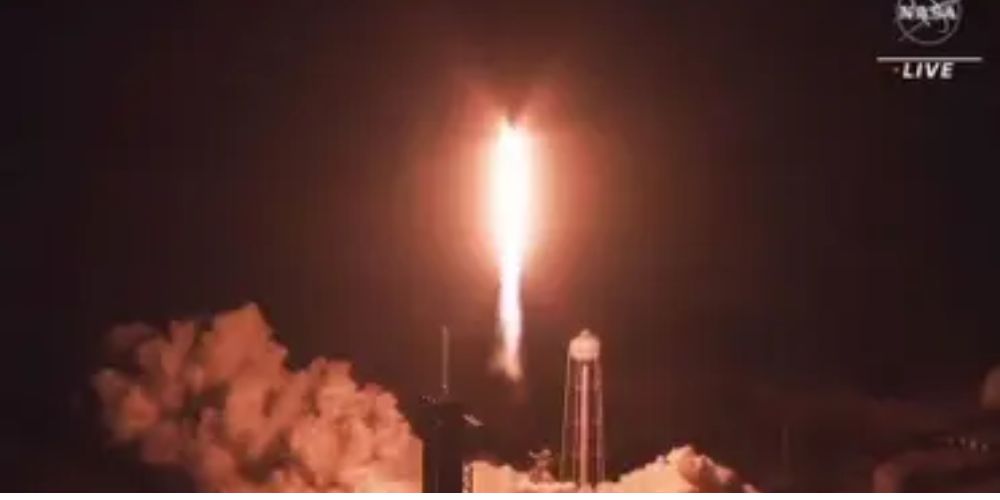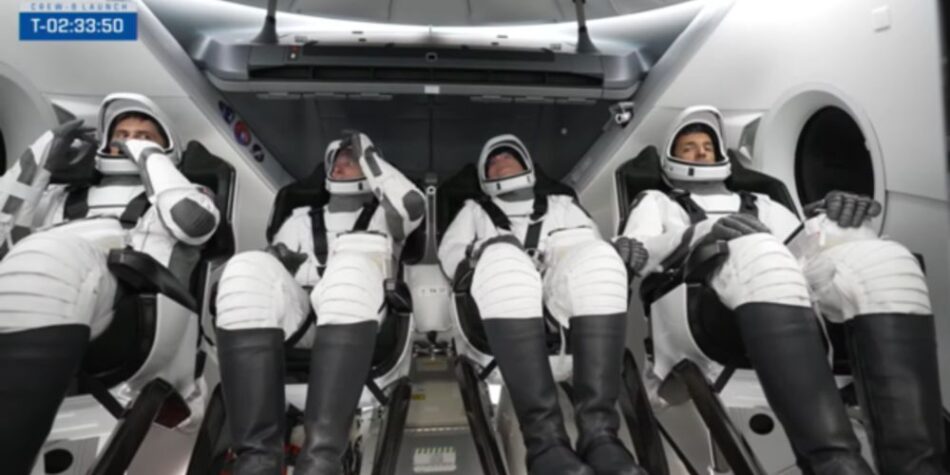The longest space mission ever undertaken by an Arab astronaut, Sultan al-Neyadi of the United Arab Emirates, successfully launched into space on Thursday.
At just before 9:40 a.m. on Thursday, the spacecraft blasted out from Florida’s NASA Kennedy Space Center. GMT, NASA announced on its live feed as applause erupted within NASA’s Space Control. As it traveled across the East Coast, the Falcon rocket lit up the night sky.
Only the second Emirati to fly into space, astronaut al-Neyadi, was watched from the launch site by close to 80 United Arab Emirates fans.
Currently, the capsule is moving at a speed of around 7,500 km/h.
The astronauts’ spacecraft, the Dragon, and the Falcon 9 separated as scheduled, according to NASA’s confirmation just after 9:50 a.m. “Thanks to my parents, my family, thanks to our leadership… thank you for everyone who trained us and made us ready for this trip,” al-Neyadi said in a message transmitted shortly after on the live feed from space.

Schools and workplaces across Dubai and the UAE aired the launch live from halfway around the world.
“Welcome to space,” radioed SpaceX Launch Control, noting that liftoff came exactly four years to the day after the capsule’s initial test voyage into orbit. Please remember to give us five stars if you appreciated your experience.
Around 24 and a half hours after launch, early on Friday morning, the four-man crew should arrive at the International Space Station (ISS), orbiting roughly 250 miles (420 km) above Earth.
State news agency WAM said on Thursday that UAE President Sheikh Mohamed bin Zayed Al Nahyan commended the space mission’s successful launch.
He stated: “Emirati engagement in this mission is considered as a step towards realizing our aim of providing a better future for generations and strengthening their participation in constructing the future.”
The ruler of Dubai, Sheikh Mohammed bin Rashid Al Maktoum, declared that the mission advanced UAE aspirations in the space industry.
“Our goal to explore space sciences is boundless, and we are eager to improve our position in this exciting industry.”
The Mohammed Bin Rashid Space Centre (MBRSC) chairman, Hamad Obaid Al Mansoori, said that the UAE’s most recent space mission would go down in history.
“When we travel to the far reaches of space, we carry the aspirations and aspirations of our country, as well as the will to change the course of history. Today we celebrate the achievement of a vision that will motivate future generations as well as the successful launch of the longest Arab space mission in history.
“We are extremely appreciative of our smart leadership, whose unwavering encouragement gives the team the courage and inspiration to keep taking on new tasks. Our goal in carrying out these scientific activities is to keep the UAE flag flying high and to lead the world in scientific contributions.
After fixing a technical issue with the Falcon 9 rocket that hindered the initial Crew-6 launch attempt on Monday, NASA and SpaceX approved the launch date for Wednesday.
The TEA-TEB ignition fluid, which is needed to start the rocket’s Merlin engines, was the source of the ground problem.
The fluid could not be effectively poured into the required compartments due to a blocked filter.
Both NASA and SpaceX researchers determined that a clogged filter on the ground was the reason after carefully examining the data and the ground system. The filter was changed by SpaceX technicians, who also purged the TEA-TEB line with nitrogen and checked that the lines were clear and prepared for the upcoming launch attempt, according to NASA.
As mission experts for an expedition to the space station, two NASA astronauts—Mission Commander Stephen Bowen and Pilot Warren Hoburg—along with UAE astronaut al-Neyadi and Roscosmos cosmonaut Andrey Fedyaev will be launched as part of the Crew-6 mission.
On Thursday, Al-family, Neyadi’s including his father and some of his six kids, witnessed him launch into space.
Experiments on anything from managing flammable materials in microgravity to human cell growth in orbit will be conducted during the six-month research mission.
The mission represents the sixth long-term ISS crew that NASA has flown on a SpaceX rocket since the commercial rocket company founded by Elon Musk, the billionaire CEO of electric car manufacturer Tesla Inc. and social media platform Twitter, started launching American astronauts into space in May 2020. Endeavour is the name of this dragon.
Al-Neyadi, 41, is the first long-duration space station team member to launch from US land and just the second person from his nation to travel to orbit.
Long-duration space missions are essential for “advancing our understanding of space and our ability to explore and employ it in the future,” according to Salem al-Marri, Director-General of Dubai’s Mohammed Bin Rashid Space Center (MBRSC).
He continued, “We have demonstrated that our objectives and the resolve to realize them are beyond bounds with the successful launch of the UAE’s second manned space mission, which is also the longest Arab space mission in history. Congrats to Sultan al-Neyadi and the entire mission crew for their tireless efforts in making this momentous occasion a reality. The 180 days on board the International Space Station are something we are looking forward to.
The UAE already has a spacecraft in Mars’ orbit, and a Japanese lender is taking a little rover to the moon. The newest astronaut selections from NASA are receiving training in Houston together with two new UAE astronauts.
The first Arab in space was the Saudi Prince Sultan bin Salman, who launched aboard the shuttle Discovery in 1985. Syrian astronaut Muhammad Faris, who was on a mission that Russia launched, succeeded him two years later. They spent a week or so in space together.
Two Saudi astronauts who are traveling to the space station on a quick private SpaceX journey funded by their government will join Al-Neyadi this spring.
The presence of three Arabs in space at once will be “very thrilling and interesting,” he predicted last week. “Our area is likewise eager to learn more,”
Especially during Ramadan, the Muslim holy month that started this month, he is taking up a lot of dates to share with his workers. He explained that while observing Ramadan from orbit, fasting is not required because it may weaken him and endanger his mission.
The ISS, which is the largest man-made object in orbit and measures approximately the length of a football field, has been continually run for more than 20 years by a US-Russian consortium that also includes Canada, Japan, and 11 European nations.


